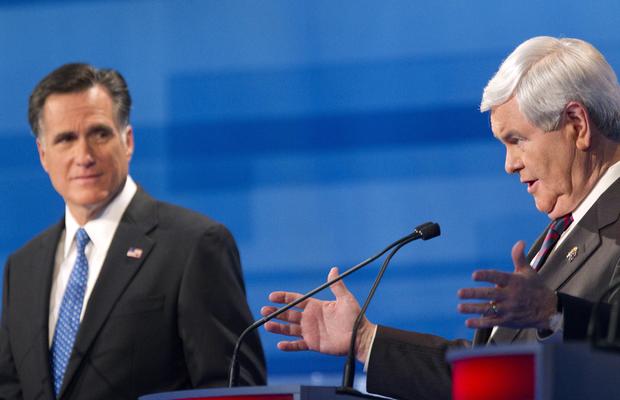Gingrich: My position should not offend blacks
Newt Gingrich on Monday continued to stand by comments he has made suggesting that poor children should serve as janitors to earn money - arguing not only that kids would benefit from the work but also that you could hire "30-some kids to work in the school for the price of one janitor."
In the 16th Republican presidential debate of the political cycle, this one in Myrtle Beach, South Carolina, Gingrich said African-Americans should not be offended by his recent comments over food stamps and child labor.
The issue was brought up by moderator Juan Williams, who said: "Speaker Gingrich, you recently said black Americans should demand jobs, not food stamps. You also said poor kids lack a strong work ethic and proposed having them work as janitors in their schools. Can't you see that this is viewed, at a minimum, as insulting to all Americans, but particularly to black Americans?"
"No. I don't see that," Gingrich replied.
GOP debate: Romney takes heat but avoids disasterRick Santorum hammers Romney over felon voting rights
Romney contradicts past comments on abortion
Romney won't promise to release tax returns
Has Romney been hunting since 2008 "small varmints" gaffe?
The former House speaker argued that children would be an affordable alternative to unionized workers - and that "they'd be getting money, which is a good thing if you're poor."
"New York City pays their janitors an absurd amount of money because of the union," Gingrich said. "You could take one janitor and hire 30-some kids to work in the school for the price of one janitor, and those 30 kids would be a lot less likely to drop out. They would actually have money in their pocket. They'd learn to show up for work. They could do light janitorial duty. They could work in the cafeteria. They could work in the front office. They could work in the library."
"They'd be getting money, which is a good thing if you're poor," he added. "Only the elites despise earning money."
Williams pointed out that some had perceived Gingrich's comments about child labor, as well as remarks he made this month singling out blacks when speaking about food stamps, as offensive to poor people and racial minorities.
"The suggestion that he made was about a lack of work ethic," Williams said. "And I've got to tell you, my e-mail account, my Twitter account has been inundated with people of all races who are asking if your comments are not intended to belittle the poor and racial minorities."
"You saw some of this during your visit to a black church in South Carolina, where a woman asked you why you refer to President Obama as 'the food stamp president,'" Williams continued. "It sounds as if you are seeking to belittle people."
Williams' comments prompted loud boos from the audience. After he finished speaking, Gingrich refused to walk back his characterization of the president.
"Well, first of all, Juan, the fact is that more people have been put on food stamps by Barack Obama than any president in American history," Gingrich said to applause. "Now, I know among the politically correct, you're not supposed to use facts that are uncomfortable."
Gingrich did not address the question of why he singled out blacks specifically when speaking about food stamps in January remarks.
"I believe every American of every background has been endowed by their creator with the right to pursue happiness," he said. "And if that makes liberals unhappy, I'm going to continue to find ways to help poor people learn how to get a job, learn how to get a better job and learn some day to own the job."
Gingrich's response was met with a standing ovation from many in the audience.
According to U.S. Census Bureau, about 28 percent of households that receive food stamps are African American, while 59 percent are white. According to the same report, about 78 percent of American households are white, while about 12 percent are black.
